Hungary accuses Croatia of 'lying' on refugee deal
Hungary has rejected claims raised by Croatia that the two European Union (EU) member states have reached an agreement on handling the refugee crisis, accusing Zagreb of “lying in the face” of Budapest and the bloc.
“Instead of honestly making provision for the immigrants, it sent them straight to Hungary. What kind of European solidarity is this?” Hungarian Foreign Minister Peter Szijjarto told a press conference on Saturday.
He accused Zagreb of “violating Hungary’s sovereignty” by allowing the migrants to cross the country and reach Hungarian borders.

“Once again, Hungary has been left in the lurch… We will defend the European Union, the borders of the Schengen zone, and we will defend Hungary in accordance with European rules,” he added.
The remarks came a day after Croatian Foreign Minister Vesna Pusic announced that Budapest and Zagreb had reached an agreement to let “vulnerable” refugees cross their territories.

Earlier in the day, Budapest also criticized Croatia over what it called failing to protect the external frontier of the EU against the influx of refugees.
“Croatia has let down not just Hungary but the EU and has given up on all legal commitments that bind it,” said Zoltan Kovacs, a spokesman for the Hungarian government, adding that Croatia is “continuously” transferring asylum seekers to the Hungarian border.

Meanwhile, Gyorgy Bakondi, a security adviser to Hungarian Prime Minister Viktor Orban, reported that Croatia had let in around 8,000 refugees on Friday.

Also on Saturday, Croatian Prime Minister Zoran Milanovic said that, “There has not been an agreement with Hungary,” saying that Zagreb has “compelled” Budapest “to accept the refugees by sending them (to the border).”
Croatia will press ahead with its policy with regard to asylum seekers, he vowed.

Milanovic had also announced on Friday that asylum seekers can use Croatia’s territory to continue their journey westward, stressing, however, that they cannot stay in the country.
“You are welcome in Croatia and you can pass through Croatia. But go on. Not because we don’t like you, but because this is not your final destination,” he said in an address to the refugees.

Hungary is notorious for adopting harsh policies against refugees, a stance that has greatly infuriated the international community and rights groups.
On Friday, the United Nations High Commissioner for Human Rights lashed out at the government in Budapest for its mistreatment of asylum seekers.
“The images of women and young children being assaulted with tear gas and water cannons at Hungary’s border with Serbia were truly shocking,” said Zeid Ra’ad al-Hussein.

Hungary is a transit zone for thousands of asylum seekers from the war-ridden countries of the Middle East and Africa who try to reach Western Europe.
The UN has predicted that the number of refugees heading for Europe will drastically increase in the near future.
“In 2015, the UNHCR anticipates that approximately 400,000 new arrivals will seek international protection in Europe via the Mediterranean. In 2016, this number could reach 450,000 or more,” read a statement by the world body.
VIDEO | Press TV's news headlines
One million homes without power as Storm Éowyn batters UK, Ireland
UN blasts Israel’s use of ‘war fighting’ methods in West Bank's Jenin
VIDEO | Hamas releases video of killing Israeli forces responsible for Yahya Sinwar’s assassination
US mercenary firms to take charge of key Gaza checkpoints: Report
‘Largest deportation in history’: US arrests, deports hundreds of immigrants under Trump
Iran censures West's double standards, unfair human rights mechanisms
On heightened watch: IRGC warns extra-regional players as naval drills get underway









 This makes it easy to access the Press TV website
This makes it easy to access the Press TV website